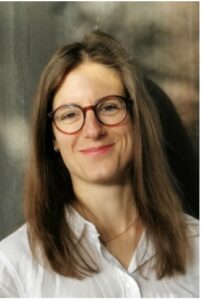ECTS basic fellowship: Eva Maria Wölfel.
 This year, ECTS basic fellowship was awarded to Eva Maria Wölfel from University of Southern Denmark. Here, Eva describes her project and the importance of support she has received from ECTS:
This year, ECTS basic fellowship was awarded to Eva Maria Wölfel from University of Southern Denmark. Here, Eva describes her project and the importance of support she has received from ECTS:
“The project aims to investigate advanced glycation end-product induced changes on microRNA levels and their effects on osteoblastic cells and bone formation to enhance our understanding of the underlying mechanisms of bone diseases characterized by high levels of advanced glycation end-products. Advanced glycation end-products form non-enzymatically through glycosylation of proteins and their accumulation in bone tissue results in stiffened collagen bone matrix and impaired bone quality leading to increased bone fragility. MicroRNAs are small non-coding RNAs involved in gene-regulated mechanisms by translating or silencing target mRNAs; they play a role in osteoblastogenesis and their regulation by advanced glycation end-products has been suggested. The ECTS fellowship allows me to combine my previous work on bone material quality in diabetes mellitus with focus on advanced glycation end-products with my recent research on microRNAs in diabetes bone fragility. Receiving the ECTS fellowship provides me with an exceptional opportunity to study effects of advanced glycation end-products and microRNAs on a molecular biological level. Further, the fellowship supports my journey to become an independent researcher and the development of my research profile. Thanks to the ECTS, I have been able to create a network within the bone research society which is further strengthened and widened by the ECTS fellowship. The ECTS fellowship is an excellent opportunity for young researchers to be supported in pursuing their research ideas and projects and I would like to thank the ECTS for selecting and supporting me as an awardee for the ECTS basic fellowship.”
ECTS clinical fellowship: Heike Weidner.
 Previosuly, I initiated an inquiry to investigate the link between bone research and hematology in two hematological diseases, namely myelodysplastic neoplasms and multiple myeloma (MM). MM is a disease characterized by uncontrolled production of plasma cells in the bone marrow, which displace healthy blood cells, causing cytopenia. Inflammation plays a crucial role in disease progression besides the malignant B cells, ultimately resulting in bone lesions caused by a lack of mineralization. FGF-23, a hormone responsible for bone mineralization and erythropoiesis regulation is upregulated in MM, and its regulation is affected by inflammation. Newly diagnosed patients with MM undergo induction therapy to reduce the number of myeloma cells and inflammation followed by autologous stem cell transplantation (SCT). Thanks to the ECTS, I will have the possibility to enhance my understanding of the correlation between FGF-23 and inflammation, as well as their interplay with bone at various stages of MM, such as diagnosis, after induction therapy, and after SCT. I believe that the findings of this research are not restricted to MM alone. They can also be applied to other hematological diseases characterized by inflammation, altered bone structure, and transplant-eligible patients. Therefore, the outcomes of this study, may pave the way for innovative therapeutic options in these overlapping research areas.
Previosuly, I initiated an inquiry to investigate the link between bone research and hematology in two hematological diseases, namely myelodysplastic neoplasms and multiple myeloma (MM). MM is a disease characterized by uncontrolled production of plasma cells in the bone marrow, which displace healthy blood cells, causing cytopenia. Inflammation plays a crucial role in disease progression besides the malignant B cells, ultimately resulting in bone lesions caused by a lack of mineralization. FGF-23, a hormone responsible for bone mineralization and erythropoiesis regulation is upregulated in MM, and its regulation is affected by inflammation. Newly diagnosed patients with MM undergo induction therapy to reduce the number of myeloma cells and inflammation followed by autologous stem cell transplantation (SCT). Thanks to the ECTS, I will have the possibility to enhance my understanding of the correlation between FGF-23 and inflammation, as well as their interplay with bone at various stages of MM, such as diagnosis, after induction therapy, and after SCT. I believe that the findings of this research are not restricted to MM alone. They can also be applied to other hematological diseases characterized by inflammation, altered bone structure, and transplant-eligible patients. Therefore, the outcomes of this study, may pave the way for innovative therapeutic options in these overlapping research areas.
Furthermore, the ECTS fellowship is an excellent opportunity to advance my scientific career by expanding my expertise in the bone and hematology field. Additionally, I am looking forward to discuss my research outcomes with ECTS members forthcoming conferences. I am grateful to ECTS for giving me this chance.
